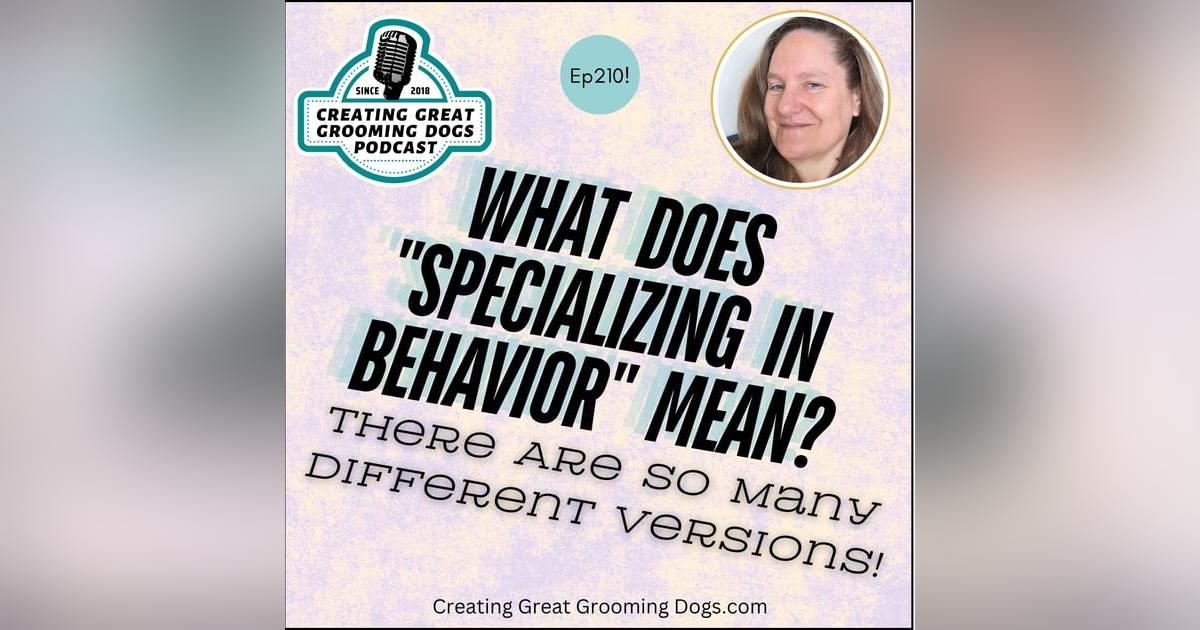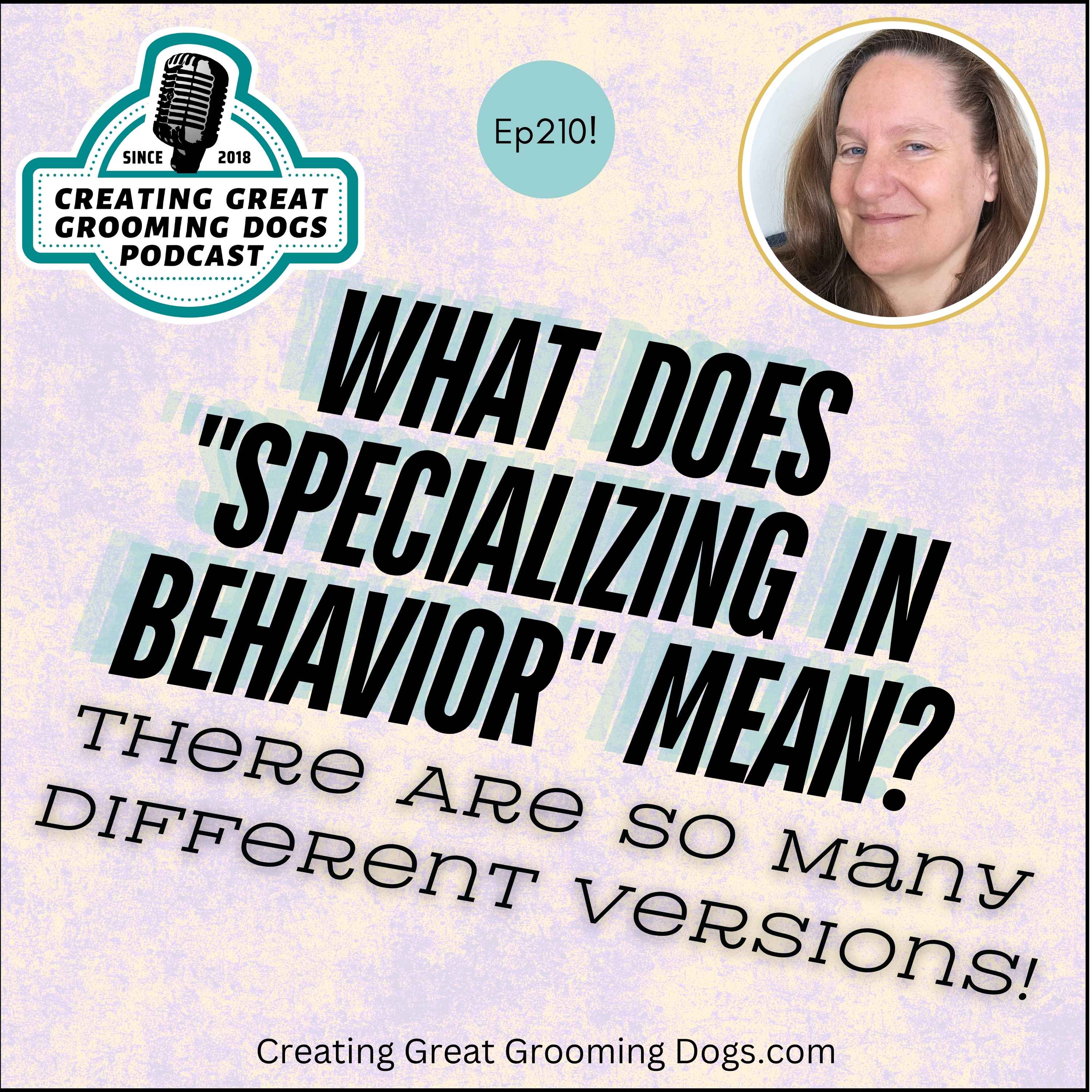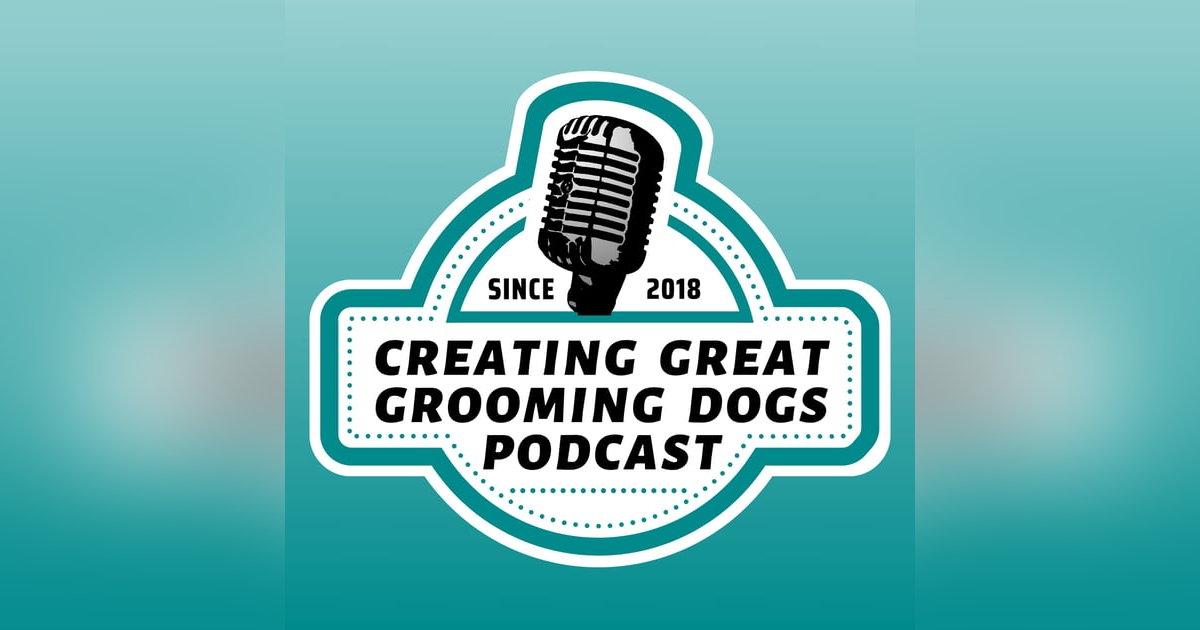What Does "Specializing In Behavior" Mean? ep210


This week, we're talking about what it means to specialize. I hear many different versions, and I think it's a pretty exciting topic because I'm a geek, and that's what I like.
For full transcripts, go to the audio episode on CreatingGreatGroomingDogs.com
For more info on all of my classes etc, go to https://link.content360.io/CreatingGreatGroomingDogs
You can also listen to this episode as a podcast on my website or anywhere you listen to podcasts.
For more information about my classes-
The full diploma program
Master Groomer Behavior Specialist(MGBS) diploma program
Shorter courses-
Modern Behavior & Handling for Groomers
Want to support the show? Buy Me A Coffee!
Episode 210 of the Creating Great Grooming Dogs podcast. Can you believe it? This week we're talking about what does it mean to specialize? Ooh, that one's pretty interesting. I hear lots of different versions and there are lots of different versions, and I think it's a pretty exciting topic because I'm a geek and that's what I like.
You are listening to the Creating Great Grooming Dog Show. I'm Chrissy Neumyer Smith. I'm a Master Groomer Behavior Specialist, a Certified Professional Groomer, Certified Behavior Consultant for Canines. Lots of other things. I'm also the Dean of Academics at The Whole Pet Grooming Academy, where I teach the Master Groomer Behavior Specialist course, and I'm one of the evaluators for the Master Canine Stylist.
So I wanna jump right in. What does it mean? To be a specialist, to specialize in the behavior stuff. The behavior stuff as a groomer, but also if you are an owner who wants to know what level of specialization am I looking at? If someone says, I love working with the dogs with behavior problems, first of all, anyone who says they love working on the behavior problems, that's a great sign.
I know that's a lot of this audience that a lot of you are like, , it warms my heart to help these dogs. I know that's you. That's me. But let's really kind of sit down and talk about what kind of criteria an owner might be looking for or another professional. And I'll also break it down for dog trainers too.
So the first level, first, if we were going through levels, the first level is somebody who has a desire. To help these dogs with their grooming needs, who with the behavior cases and their grooming needs. That's the first level. Maybe they have read a bunch of books, go to webinars. Uh, maybe they listen to this podcast.
Mm. Right. But , that's kind of our first level, right? We have, we have an interest, we have a desire to build a knowledge base. We read some books. We listen to podcasts. We attend webinars next level is maybe you go to, , lectures, maybe you've been to one of the barley shows where someone is teaching about behavior.
That's a great place to go, but there's no testing yet. I'm talking about just attending lectures. Good to know. Great. Let's do that. I do that. I listen to stuff. I read books. I attend lectures. So attending lectures. Another great step. Reading books, all these things. So far, we're not into anything where you have tests. Tests are important because it means that someone else is evaluating. Have you absorbed what we've tried to teach you?
It's an important part. There are lots of times where people are just nervous about taking tests and please do not let that limit you. If you are one of those people who's like, I really wanna do more, but test taking makes me so nervous. Reach out directly. I will talk you through it. I think that, testing is important.
So let's talk a little bit more about the next level. Next level is maybe you have taken a couple of short classes that actually have some testing. I would put, , the Fear Free Course into that Fear Free. Took me a weekend for the Fear Free Groomer. I also have the Fear Free Trainer that took me another weekend, not super long, packed with a bunch of information.
, and there's a test. , I have a couple of short classes. There's the Groom Smart class, and there's Modern Behavior and Handling for Groomers through The Whole Pet Grooming Academy, which I mean, not to be salesy, but you guys know I'm Whole Pet, but a couple of short classes can really help you understand the content better. That's why testing is really important. When we're attending a lecture or listening to a podcast or reading a book, we might be skimming past stuff because , we aren't expecting to have a test. When you are expected to test, I think it does something different about the way that you're learning.
You are far more likely to try to bring attention to every detail. It's a significant difference. So if we are listening to a podcast, , maybe that's a matter of going back and listening two or three times I do that. I'm a dork, I go back, I take notes. , but testing is an important part. So even if it's a short course, the idea that you are paying more attention because you know there's gonna be a test at the end.
It's an important part, and it doesn't necessarily mean like these courses alone don't mean that you're going to be awesome or that you're a beginner. It just tells us a little bit more about if someone else has also evaluated how much, you know. So, next level. I'm gonna throw out my course, the Master Groomer Behavior Specialist course.
I'm gonna put that out there above Fear Free because quite frankly, it's longer. There is so much more content. I think that I get compared to Fear Free pretty often. So let's break it down a little bit. Like I said, I did the Fear Free Program in a weekend. The Master Groomer Behavior Specialist program is 32 modules.
Each, each week we do about two hours of work. So each module has online classwork, and then we meet for an hour of live zoom call. That's 64 hours of content for those playing at home. And you could not possibly cram even just the content part into a weekend. And that's where the scale really changes.
Like, oh, yes, that's a lot more work. It's a lot more time and it also has testing, actually quite a bit of testing, sorry. , but that's a trade level course. I feel like the master groomer behavior Specialist is for helping groomers specialize in the behavior part of dog grooming.
It does not make you a dog trainer. The next level, if you want to achieve the next level is to actually become a dog trainer. Along with being a groomer and there are a bunch of us out there and more are great. I would love to see you become a dog trainer. If you're a groomer, I would love to see you become a dog trainer too.
I think it would just enhance your skillset. If you're a dog trainer, I would love to see you become a dog groomer too. Get some grooming under your belt, because those two fields are very, very different. We need more of us who cross over into both. So that's pretty much the trade level stuff and.
For dog groomers, I want you to know that the dog training world is kind of struggling with the same things we're struggling with in the dog grooming world. Very, very often we're trained on the job, not formal education. Very, very often we're. Getting certifications maybe through our workplace, but not necessarily through a certifying body , there are a lot of the same kind of problems.
So if you are interested in learning more about dog training, there are a number of different ways to do it, A number of different venues and. Come on folks. Just reach out. Reach out. Ask me if that's something you wanna do. I wanna help you learn and grow and do neat things. Now, the next step, if you are doing both. What is the next step? And that's where we start getting into college degrees. College degrees, formal education. Maybe it's a Bachelor's degree in behavior, maybe it's a bachelor's degree in Psychology. Maybe it's a Bachelor's degree in Animal Science with some sort of Zoology.
But that's where we go beyond into college degrees of a variety of sorts. Now, every once in a while. , I hear people referring to the term Behaviorist. And while we're here talking about levels, let's also talk about Behaviorist in the United States, a Behaviorist is , supposed to be, I'm gonna say that 'cause.
Sometimes people use the term, , wrong is supposed to be a Veterinarian who has gone beyond into specializing in behavior. So think Veterinary, Cardiologist, Dermatologist, Behaviorist. That's not a term we throw around loosey goosey. The other version of a Behaviorist in the United States is a PhD in Behavior.
So basically if they don't answer to Doctor something or other, how disrespectful Doctor something or other, if they don't respond to Doctor, then they are probably not a Behaviorist in the United States. They may be a Behavior Consultant. They may be, a Master's degree.
There are a lot of other degrees. But in the United States, a Behaviorist is Doctor level. Here's where it gets tricky. That term gets used differently in other countries. So sometimes if someone is in the UK and they say they're a Behaviorist, my first thought when someone says I'm a Behaviorist is to ask, where are you located?
'cause if they're in the United States and they're a dog trainer. They are not a Doctor. That's taboo. There's no law against it. It's just bad form. Okay. Now, if they are in the UK, there are different criteria that they can meet, and that's part of more of, um, from what I understand anyway, more of the Behavior Consultant kind of track.
So dog training and Behavior Consulting are a little bit different, but they're trade level. And so in the UK and probably some other places, they may use the term Behaviorist differently than we do in the United States. Now, why does all of this matter? Well, we'll go into that in the next part.
Why does it matter if your groomer has tons of experience working with dogs who have behavior problems? Hasn't done any sort of testing, hasn't done any courses that require testing. , maybe, reads books, listens to podcasts. I'm gonna say that the difference is, is that if you are an owner looking for someone to help you with your pet,
if they say they're a specialist, it implies that they have more education. And maybe they do, maybe they don't. And I think that for full transparency. If you are a groomer saying you specialize with dogs with behavior problems, you should also tell owners what that means in your facility, in your workplace, and what that means to you.
I think that sometimes I'm hearing it from people who simply like working with the dogs that have a lot of behavior problems, but maybe have no experience with teaching them to be good. So here is a little thing for us to think about when somebody says to me that they work with a lot of behavior cases and that's what qualifies them to answer these questions.
My question for them, my question for you. My listeners is how many dogs do you groom who are great for grooming, who used to be your behavior cases? Because I think that non dog trainers sometimes think working around the problem is what people are looking for, but we're looking to solve the problem, not.
Looking to do beautiful trims over behavior problems, and that can be really kind of like splitting hairs. I've had people go, well, really what's the difference? One of these is trying to help the dog be better. The other one is more about getting a great trim done, and yet over and over and over again, what we keep seeing is that.
If a dog is nervous or having difficulty with grooming, and we continue to do the trimming and we continue to focus in on the haircut, we're kind of assuming that this dog is gonna realize like, oh, that wasn't so bad, and eventually get better. Yet, it usually doesn't work that way. Once in a while, it does just often enough to keep that myth going.
So when somebody says, I specialize in the dogs with behavior problems, I think it's fair to ask like, which version are they talking about? Because you know what, if your dog's problem, if you're an owner and your dog's issue is just that they need someone who's gonna like lighten it up. Be a little bit more patient, break grooming sessions up into smaller bits, then maybe you don't need someone with a lot more experience.
Maybe you don't need someone who has a lot of testing behind them or have gone through more criteria. Maybe you are gonna be just fine with someone who maybe listens to this podcast and says, all right, I. I'm willing to work with your pet. Let's just calm him down. , help him be comfortable.
Make this as pleasant as possible. But if you have a dog who has some real anxiety, you know what? You're probably gonna need someone with more experience and not just time spent working with dogs with behavior problems, but someone who has some real education, and maybe that is beyond. The Fear Free groomer.
Maybe that's beyond the Master Groomer Behavior Specialist. One of the things that I teach my students is when we need to collaborate. We need to work with the trainer, work with the Vet, maybe have the Vet send them to a Vet Behaviorist, where it becomes this group effort because some of these dogs have some really significant problems.
So let's think about who we're asking to do what job. Who are we asking to do what job? , groomers. I think you're used to things like, oh, this is a beginner groomer, someone early in their career, and maybe we don't hand them a really complicated trim if we don't have someone helping them. That's pretty common for dog groomers.
We're like, oh, they're, they've learned how to use clippers. They're beginning scissor work. I'm probably not going to give them a dog with a significant amount of scissor work if I'm not also there to help them with it. Same thing with behavior cases. Okay. I want you to think about behavior cases as something that takes some expertise.
Just like hand scissoring, just like hand stripping, just like breed trims, whatever you're thinking of, like, oh, right, I need more practice and I need some help with that, or I wanna help people with that because this audience, can I just say how proud I am? Of the Creating Great Grooming Dogs family because this audience is spectacular but think about how many, times you've worked with a problem that's similar to that.
When to say, this isn't something I've worked with before. When to say it's time to collaborate. When to say, maybe my version of dog grooming isn't a good fit for your individual dog and . What they're having issues with. I feel like I need to unpack that more. So for instance, if you are working with a dog whose biggest issue is that they're easily overstimulated by being around other pets, perhaps a grooming van or house call, or someone who does one-on-one , no other dogs in the room kind of grooming might be a better fit if you have a dog who cannot handle a long duration.
Maybe house call or grooming van is not a good fit because we are in a situation where we're doing start to finish grooming, but a grooming salon might be a great place because you can take that dog out and work with them for 10 minutes and then give them a break.
So you have to also consider is my version of grooming is my facility or my business. Good setup for this other person, and this dog and owners don't really understand this part. And frankly, if you're not a groomer, you might have trouble understanding this part too, that there are lots of different scenarios.
So we need to try to. Help guide our owners to the resources they need. And with more education, you're more likely to know what resources do I wanna guide this person to? Who do I want to send them to? What do I think will be the best outcome for this individual dog? And like I said, it might be collaborating with a trainer.
And here's where we start talking about when trainers say they do cooperative care. All right. That's great. If you're a dog trainer listening to this show, you probably have a different idea of what grooming entails. But I gotta say, as a dog trainer, when I'm talking to dog trainers, they often don't understand the grooming process.
They often don't understand like, well, why does he need the fluff out? It's not a fluff out. Some of these dogs need to have their coats dried because it's different than going swimming. We are saturating them down to the skin when they're swimming, they are not getting soaked like that. So when we start talking to owners about what their dog needs, , trainers are often kind of at an owner level and many trainers think, well, I've worked cooperative care.
But if they haven't been around grooming, there might be some blind spots. Again, this is where we collaborate. Collaborate. Collaborate and talk to each other because a lot of dog trainers think that, you know, a 10 minute session is like, wow, we did 10 minutes, and groomers are all like 10 minutes. We often have these dogs for an hour and a half, two hours, maybe more.
So collaborate and figure out where everybody's at, and all of these levels are just fine. Just reading some books and like listening to podcasts, like, yeah, heck yeah, awesome. The desire to help these dogs, you're already there. That's great. But to know when you need to bump it up to somebody else who might know more.




























 My Classes
My Classes